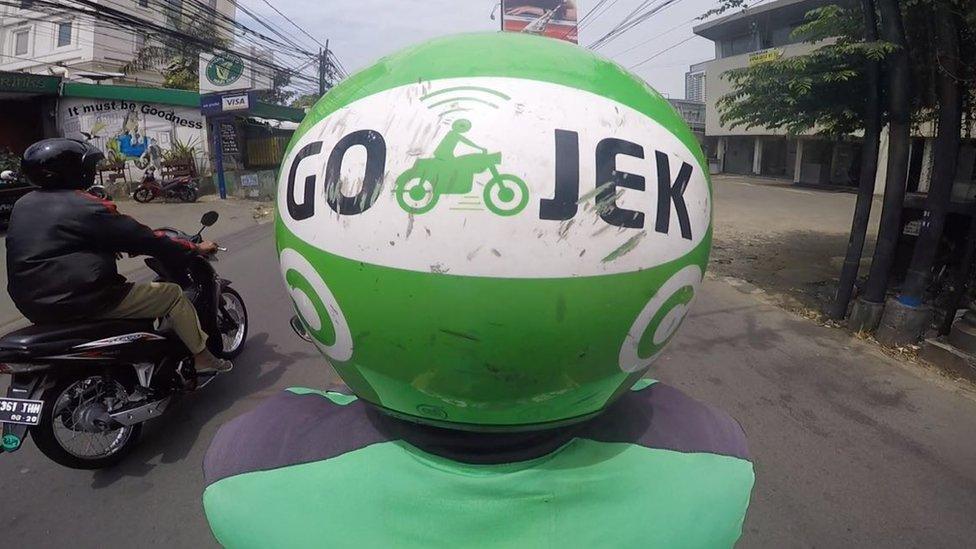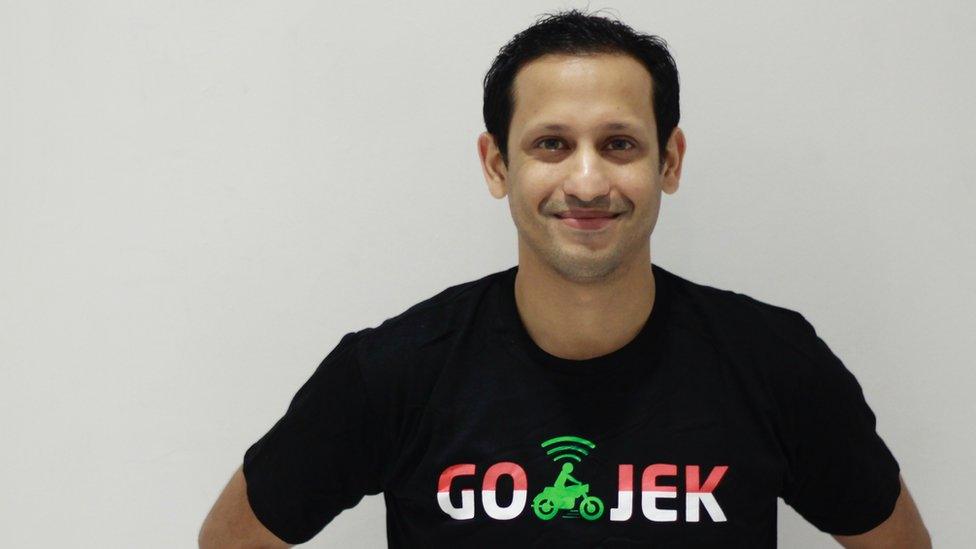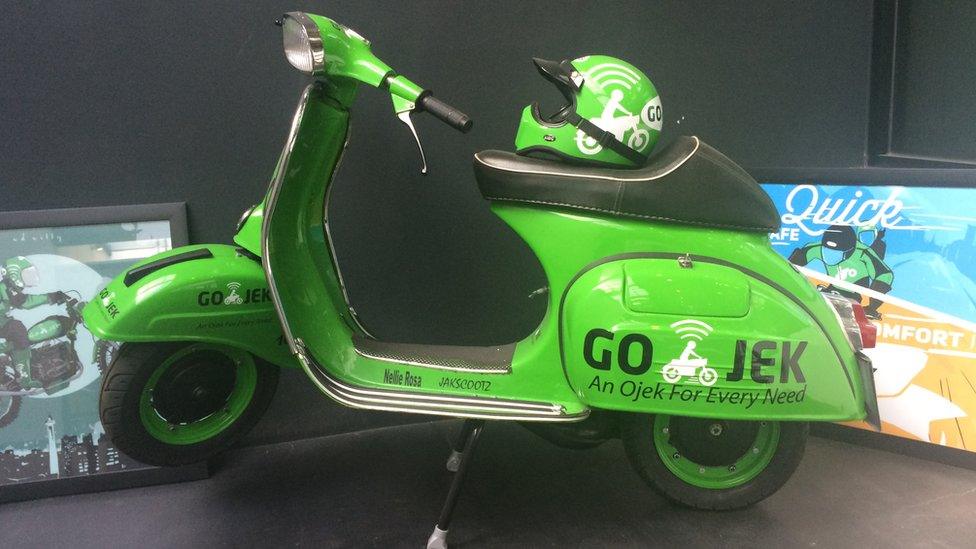Go-Jek: On the go in Jakarta
- Published
"You have to out-innovate everybody else," says Go-jek's Nadiem Makarim
Nadiem Makarim is forthright about traffic conditions in his home town of Jakarta.
"The population explosion here has created the most congested city in the world," says the founder of Indonesian motorbike taxi and delivery business Go-Jek.
Just look at the numbers. The giant capital on the island of Java has an estimated population of more than 10 million people, with Greater Jakarta accounting for about 30 million. It's also home to an estimated 18 million motor vehicles.
The average speed a car can travel at is about 8km/h - a situation economists agree is hurting the city's growth capacity. Business visitors say they usually schedule just one meeting per day. The traffic is too terrible to make a second, they say.
So what's the solution?

Go-Jek's name was formed using the Indonesian word for an informal motorcycle taxi - "ojek"
Indonesian-born Mr Makarim thinks he's found it.
Large-scale execution
His firm, Go-Jek, which was launched in 2011 as a simple motorbike courier business, has evolved into a multifaceted service delivery and app-based transport provider. And it's taking Jakarta by storm.
"I probably wasn't the first to come up with the idea of Go-Jek," 30-year-old Mr Makarim admits. "A lot of people before me have thought of it as well. It's just that we were the first ones to execute this on a large scale."

Despite launching in 2011, Mr Makarim didn't start working full-time for Go-Jek until 2014
The Harvard Business School graduate said he started out by approaching groups of informal motorbike taxis in Jakarta.
Referred to as "ojeks", these motorbike drivers work in groups on the city's streets offering anyone a ride for a few dollars. They're experts at weaving in and out of heavy traffic and are regarded as the most efficient and cheapest way to get from one place to another.
"I was doing summer internships during my business school time and I'd just hang out with street ojeks and buy them coffee and find out what their economic condition was like," Mr Makarim says.
"I wanted to find out... what they did and didn't like about their job.
"And that's when I quickly realised there was so much more that these guys could do. They were working 14-hour days with not much to show for it. Maybe just five bookings a day."
So Mr Makarim recruited a handful of drivers to work as freelancers for his start-up courier business.
Initially operating from a small apartment with a few staff taking calls for deliveries "from mostly family and friends", Go-Jek has transformed itself into a mobile app service with some 200,000 freelance drivers together with hundreds of other service providers.

Go-Massage is just one of the many services Go-Jek offers its customers via its app
"Within three months, three million people had downloaded the application - something we totally did not expect," Mr Makarim says. "We hit our end-of-year target in two months.
"Within a year we had over 11 million downloads, which was beyond all our expectations."
Customers can use the app to book a motorbike taxi, order food delivery, cleaning services, and even door-to-door beauticians and masseuses. Go-Jek has just launched Go-Car and after partnering with some of Indonesia's biggest banks, the firm is in the process of making its payment system cash free.
No easy ride
But the transformation from a start-up to a fully-fledged business hasn't been easy, Mr Makarim admits. Since 2011 there have been plenty of challenges.

Go-Jek became the umbrella name for the firm after it expanded to provide services other than motorbike taxis
"Our system nearly imploded from overuse soon after it launched. Then there was a temporary 12-hour ban, external on app-based transportation in Indonesia. We were extremely elated when that decision was overturned by the president and vice president," he says.
Other problems the firm has faced stem from the marketplace it's operating in.
Major competitors on the streets include app-based transport companies Uber and Grab, as well as local taxi companies. Earlier this year, street demonstrations led by traditional taxi drivers against firms like Uber became violent.
Scenes of a Go-Jek jacket being burned on the streets, external made headlines and some Go-Jek drivers were hurt during the demonstrations.
"That was a big problem that occurred... but we got through that," Mr Makarim says.
"The government is behind us, very supportive, and as long as we're improving the welfare of the majority of the people in the country, then we think people will ultimately support [us]."
Road to success?
Other hurdles the firm has had to overcome include securing financial backers.
"From our start in 2011, I didn't start working for the company full-time until after we got some investment backing," Mr Makarim says.
Singapore-based NSI Ventures, which is part of the Northstar Group, first invested in Go-Jek in 2014.
Other investors reportedly involved include Sequoia Capital, SoftBank, Vertex Venture and Yuri Milner's DST Global, though Mr Makarim prefers not to discuss the details of their involvement.
He's clearly grateful for their input, though. Earlier this year, external, he said the firm was aiming for a valuation of more than $1bn.

The company today offers cleaning, food and beauty deliveries, as well as motorbike taxi services
"Before [we had investors] I couldn't afford myself, so I had to go work for other people," he says. "I came onboard full-time in 2014 and we launched the app in 2015."
Mr Makarim refuses to discuss the firm's financials, but when asked if he would sell Go-Jek for the right sum, he says: "Sell up? Well... our investors need to profit at some point from their investment, but I don't see a sale happening anytime soon."